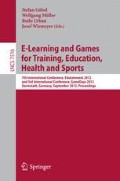Abstract
Several empirical studies confirm the importance of time-awareness in learning disabilities. Designed tools and environments to interact with time are essential for the training and diagnosis of an impaired notion of time. Training which improves sense of time may improve learning, daily functioning and quality of life. This paper reviews perceptual and computational time models in literature and present briefly our first attempts in applying the knowledge in the design of playful tools for children to orient their time.
Access this chapter
Tax calculation will be finalised at checkout
Purchases are for personal use only
Preview
Unable to display preview. Download preview PDF.
References
Gibbon, J., Malapani, C., Dale, C.L., Gallistel, C.: Toward a neurobiology of temporal cognition: advances and challenges. Current Opinion in Neurobiology 7, 170–184 (1997)
Hazeltine, E., Helmuth, L.L., Ivry, R.B.: Neural mechanisms of timing. Trends in Cognitive Sciences 1, 163–169 (1997)
Ivry, R.: Cerebellar timing systems. International Review of Neurobiology 41,555 (1997)
Hurksa, P.P.M., Hendriksenbc, J.G.M.: Retrospective and Prospective Time Deficits in Childhood ADHD: The Effects of Task Modality, Duration, and Symptom Dimensions. Child Neuropsychology 17, 34–50 (2010)
Pomeroy, S.: 24h Analog Clock Widget (2011, May 1, 2012) https://play.google.com/store/apps/details?id=info.staticfree.android.twentyfourhour
GoLearn International Inc. TimeBuddy (May 1, 2012), http://timebuddy.com
BBC. Clockworks, A fun activity to help children at KS1 learn about telling the time (May 1, 2012), http://www.bbc.co.uk/bitesize/ks1/maths/telling_the_time/play/
FreeTrainingTutorial.com. Telling Time Games (May 1, 2012), http://www.free-training-tutorial.com/telling-time-games.html
Grondin, S.: Timing and time perception: a review of recent behavioral and neuroscience findings and theoretical directions. Attention, Perception, & Psychophysics 72, 561–582 (2010)
Zimbardo, P.G., Boyd, J.N.: Putting time in perspective: A valid, reliable individual-differences metric. Journal of Personality and Social Psychology 77, 1271 (1999)
Hu, J.: Design of a Distributed Architecture for Enriching Media Experience in Home Theaters, PhD Thesis, Department of Industrial Design, Eindhoven University of Technology, Eindhoven (2006)
Hu, J., Feijs, L.: IPML: Structuring Distributed Multimedia Presentations in Ambient Intelligent Environments. International Journal of Cognitive Informatics & Natural Intelligence (IJCiNi) 3, 37–60 (2009)
Bartneck, C., Hu, J., Salem, B., Cristescu, R., Rauterberg, M.: Applying Virtual and Augmented Reality in Cultural Computing. International Joural of Virtual Reality 7, 11–18 (2008)
Author information
Authors and Affiliations
Editor information
Editors and Affiliations
Rights and permissions
Copyright information
© 2012 Springer-Verlag Berlin Heidelberg
About this paper
Cite this paper
Langereis, G., Hu, J., Gongsook, P., Rauterberg, M. (2012). Perceptual and Computational Time Models in Game Design for Time Orientation in Learning Disabilities. In: Göbel, S., Müller, W., Urban, B., Wiemeyer, J. (eds) E-Learning and Games for Training, Education, Health and Sports. Edutainment GameDays 2012 2012. Lecture Notes in Computer Science, vol 7516. Springer, Berlin, Heidelberg. https://doi.org/10.1007/978-3-642-33466-5_21
Download citation
DOI: https://doi.org/10.1007/978-3-642-33466-5_21
Publisher Name: Springer, Berlin, Heidelberg
Print ISBN: 978-3-642-33465-8
Online ISBN: 978-3-642-33466-5
eBook Packages: Computer ScienceComputer Science (R0)

